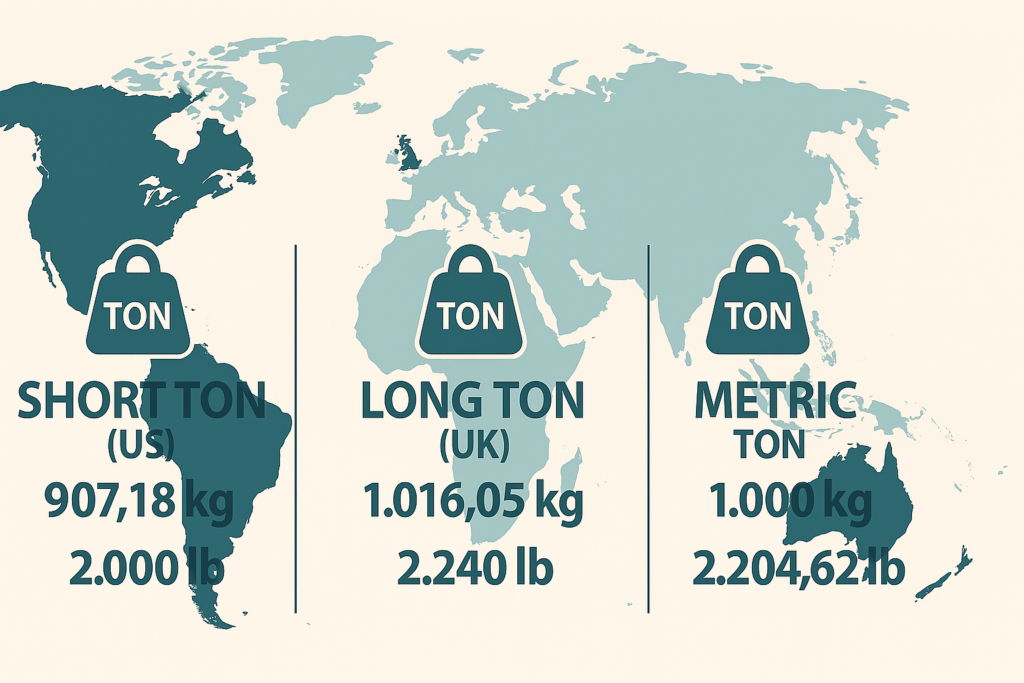When someone mentions a “ton,” do you know exactly how much weight they’re referring to?
You might assume 1 ton = 1,000 kilograms. But what if we told you that not all tons are created equal?
Across the world, different countries use different types of tons — and confusing them can lead to costly mistakes in trade, travel, education, or engineering. Whether you’re an exporter, student, or global traveler, understanding international ton conversion standards is essential.
In this blog, we’ll explain the three major ton standards, how they differ, where they’re used, and how to avoid confusion when converting them.
Not All Tons Are Created Equal
In the world of weights and measurements, the word ton has more than one definition. While they sound the same and are spelled similarly, short tons, long tons, and metric tons are not interchangeable.
Let’s break it down.
1. Short Ton (US Ton)
- Also called: Net ton
- Used in: United States
- Equals: 2,000 pounds or 907.1847 kilograms
The short ton is standard in the United States, particularly in industries like freight, agriculture, and heavy machinery. If you’re working with American companies or data sheets, it’s very likely referring to short tons.
Example:
A shipment weighing 10 US tons = 10 × 907.18 = 9,071.8 kg
2. Long Ton (UK Ton)
- Also called: Imperial ton or gross ton
- Used in: United Kingdom (historically)
- Equals: 2,240 pounds or 1,016.0469 kilograms
The long ton was traditionally used in the UK and other Commonwealth countries before metrication. It’s heavier than both the short ton and metric ton. It still appears in some naval, shipping, and legal documents.
Example:
5 long tons = 5 × 1,016.05 = 5,080.25 kg
3. Metric Ton (Tonne)
- Also called: Tonne (with two “n”s)
- Used in: Nearly every country except the US
- Equals: 1,000 kilograms or approximately 2,204.62 pounds
The metric ton is the international standard under the SI (International System of Units). It’s used in global commerce, scientific contexts, and standardized international reporting.
Example:
20 metric tons = 20 × 1,000 = 20,000 kg

Easily convert tons into kilograms, grams, and metric tons with our user-friendly conversion tool. This tool is perfect for students, professionals, and businesses needing quick and accurate conversions.
Comparison Table
| Ton Type | Kilograms (kg) | Pounds (lbs) | Commonly Used In |
| Short Ton | 907.18 kg | 2,000 lbs | United States |
| Long Ton | 1,016.05 kg | 2,240 lbs | United Kingdom (historic) |
| Metric Ton | 1,000 kg | 2,204.62 lbs | Most of the world |
Regional Use Cases
United States
- Default is short ton (2,000 lbs)
- Used in industries: shipping, mining, farming
United Kingdom
- Historically used long ton (2,240 lbs)
- Now primarily uses metric ton in commerce
Europe, Asia, Australia, Africa
- Metric ton (1,000 kg) is standard
- Used in everything from food labeling to international trade
International Trade
- Metric ton is typically the default
- Ensure clarity in contracts by stating “metric ton” or “tonne”
Tips for Travelers, Exporters, and Students
1. Label Your Units Clearly
- Instead of writing “ton,” specify:
- US short ton
- UK long ton
- Metric ton / tonne
2. Always Convert with the Right Standard
- Don’t assume all tons are 1,000 kg.
- Check the source country or document origin.
3. Use Conversion Tools (Carefully)
- Use calculators, but verify the default ton type.
- Not all tools distinguish between short and metric tons.
4. In Academia
- For international exams, tonne = 1,000 kg unless specified.
- Physics and chemistry follow SI units, so it’s always the metric ton.
5. In Legal or Commercial Contracts
- Write full unit names to avoid disputes.
- Example: “5 metric tons (1,000 kg each)” vs. “5 tons”
Conclusion: Precision Matters
When dealing with weight conversions, especially tons, precision is key. A small misunderstanding between short, long, and metric tons can lead to huge discrepancies — especially in industries like shipping or manufacturing, where thousands of tons may be involved.
Remember:
- US: Short Ton = 907.18 kg
- UK (old): Long Ton = 1,016.05 kg
- Worldwide: Metric Ton / Tonne = 1,000 kg
Always double-check which ton you’re working with and clearly label the unit when documenting or communicating weights internationally.

